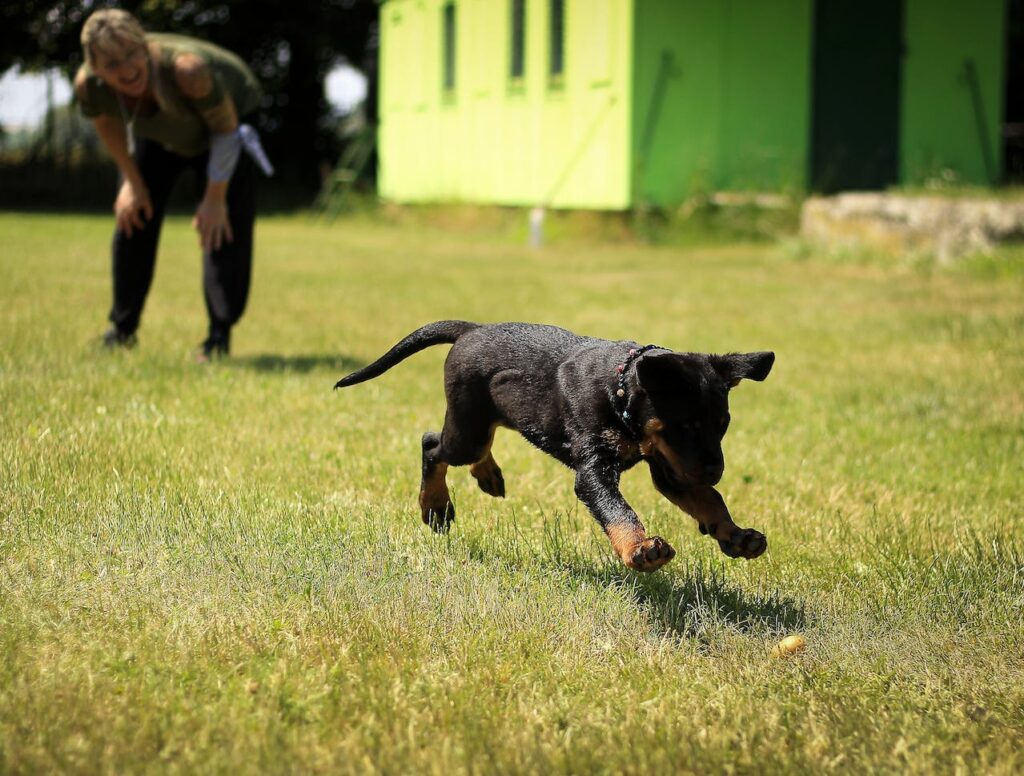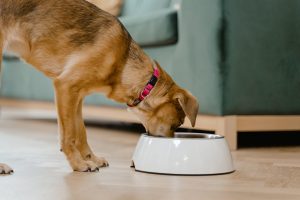Salmon is a nutrient-rich fish defined by its high omega-3 fatty acid content. When feeding dogs, it offers benefits for skin and coat health. Ensure it’s cooked, boneless, and free from additives. Moderate servings are advised, and consultation with a vet is recommended before incorporating it into a dog’s diet.
In this post, we’ll see whether you can feed your dog salmon, what are its benefits, harmful effects and most importantly, things to know (facts) about salmon. Additionally, we would also take a look at the nutritional value and the proper way to feed dogs salmon. Finally, we will answer the most important questions about this topic and share the final verdict.
But, firstly – let’s see, can dogs eat salmon?

Table of Contents
ToggleCan Dogs Eat Salmon Safely?
Yes, dogs can eat salmon. Provide 1-3 oz of cooked, boneless salmon per 10 lbs of a dog’s weight. It should be served plain, without added seasonings. Be cautious of bones, and ensure it’s fully cooked to avoid parasites. Salmon is rich in omega-3 fatty acids, promoting a healthy coat and supporting immune function, but excessive consumption can lead to nutritional imbalances. Consult with a vet for personalized advice.
Benefits of Feeding Your Dog Salmon (6 Benefits)
Salmon is beneficial to dogs. Here are 6 key advantages:
- Rich in Omega-3 Fatty Acids: Supports a healthy coat and skin.
- High-Quality Protein: Aids muscle development and overall health.
- Essential Nutrients: Provides vitamins and minerals for overall well-being.
- Cognitive Support: Omega-3s may support brain health.
- Anti-Inflammatory Properties: Helps reduce inflammation.
- Joint Health: Supports mobility and joint function.
Harmful Effects of Feeding Your Dog Salmon (6 Harms)
Salmon can be harmful to dogs. Here is a list of 6 potential adverse effects:
- Risk of Parasites: Raw or undercooked salmon may contain parasites harmful to dogs.
- Threat of Bacterial Infections: Salmon may carry bacteria like Salmonella that can cause infections.
- High Mercury Content: Excessive consumption may lead to mercury toxicity.
- Allergic Reactions: Some dogs may be allergic to salmon proteins.
- Pancreatitis Risk: Fatty salmon can contribute to pancreatitis in susceptible dogs.
- Bone Hazards: Small bones pose a choking or obstruction risk.
Things to Know About (Facts) about Salmon
In this section, we will discuss some facts and things to know about salmon.
| Attribute | Description |
| Species | Salmon encompasses various species like Chinook, Coho, etc. |
| Omega-3 Fatty Acids | Rich source of essential omega-3 fatty acids, beneficial for heart health. |
| Protein Content | High-quality protein aiding muscle development and repair. |
| Vitamin D | Good source of vitamin D, crucial for bone health. |
| Astaxanthin | Pigment responsible for the pink color; has antioxidant properties. |
| Selenium | Contains selenium, supporting the immune system. |
| Calories | Caloric content varies based on preparation and type. |
Nutritional Value of Salmon
In this section, we will discuss the nutritional value of salmon.
| Nutrient | Value per 100 g | Unit |
| Calories | 206 | Kcal |
| Protein | 25 | g |
| Total Fat | 13.4 | g |
| Saturated Fat | 2.4 | g |
| Monounsaturated Fat | 5.6 | g |
| Polyunsaturated Fat | 3.3 | g |
| Omega-3 Fatty Acids | 2.3 | g |
| Cholesterol | 67 | mg |
| Sodium | 50 | mg |
| Potassium | 397 | mg |
| Vitamin D | 570 | IU |
| Vitamin B12 | 4.8 | µg |
| Selenium | 31.7 | µg |
How to Feed Dogs Salmon?
Here is a 4-step guide on how to feed your dog salmon:
- Select Quality Salmon: Start with fresh, high-quality salmon.
- Thorough Cooking: Cook the salmon thoroughly to eliminate harmful bacteria.
- Bone Removal: Remove any bones and ensure it’s boneless.
- Portion Control: Serve it in small, bite-sized portions appropriate for your dog’s size.
Things to Take Care of (Precautions) Before Feeding Your Dog Salmon:
Here are some precautions you must take before you feed your dog salmon:
- Avoid Seasonings: Avoid using spices, garlic, onions, or excessive salt.
- Say No to Raw Salmon: Raw salmon can contain parasites harmful to dogs.
- Allergy Watch: Introduce salmon slowly to monitor for any allergic reactions.
- Moderation is Key: Serve in moderation to prevent digestive issues.

Can Dogs Eat Alternative Forms of Salmon?
In this section, we will discuss if dogs can eat alternative forms of salmon such as raw salmon, smoked salmon, and more.
Can Dogs Eat Raw Salmon?
Yes. Dogs can eat raw salmon in small quantities. However, caution is needed due to potential parasites. Small portions, once in a while, are okay. If feeding raw, freeze it for a few days to reduce the risk of parasites. Monitor for signs of parasites and allergies.
Can Dogs Eat Smoked Salmon?
No. Dogs should not eat smoked salmon. The smoking process introduces additives and excessive salt. Avoid feeding smoked salmon to dogs. Do not include smoked salmon in your dog’s diet. It may lead to salt toxicity and digestive issues.
Can Dogs Eat Canned Pink Salmon?
Yes. Dogs can eat canned pink salmon in moderation, but only if it’s plain and without added ingredients like salt or seasoning. Offer small amounts as an occasional treat. Ensure it’s plain, without added salt or spices. Check for bones and choose a low-sodium option.
What Other Fish can a Dog Eat?
Here is a list of 5 other fish that your dog can eat:
- Cod
- Trout
- Haddock
- Pollock
- Catfish
Frequently Asked Questions (FAQs)
In this section, we will discuss some frequently asked questions regarding salmon and feeding them to dogs.
What are the nutritional attributes of salmon?
Salmon is rich in omega-3 fatty acids, high-quality protein, vitamins D and B12. It also provides essential minerals like selenium. These nutrients support a dog’s overall health.
Is salmon skin safe for dogs?
Yes, dogs can eat cooked salmon skin in moderation. Ensure it’s free from seasonings and cooked without excessive oils.
How does canned salmon compare to fresh for dogs?
Fresh, cooked salmon is preferable for dogs due to lower sodium content and absence of additives. Canned salmon may contain added salt and preservatives, impacting its nutritional value.
Which salmon variations should be avoided for dogs?
The following 3 salmon variations should be avoided for dogs:
- Smoked salmon
- Salmon with added seasonings or spices
- Raw or undercooked salmon
Conclusion
In conclusion, dogs can safely enjoy salmon, a nutritious source of omega-3 fatty acids and protein. It is crucial to choose appropriate variations, such as cooked or canned salmon without additives. While providing various health benefits, precautions like removing bones and avoiding seasoned varieties ensure a positive feeding experience for your canine companion.



